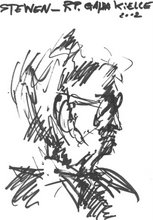My mind was just wandering and up popped a recollection of a news item about Polish sports personalities getting less money from advertising than their foreign counterparts. The prime problem seemed to be that the non-Polish public were expected to find it difficult to recognise their names.
Following the line of thought, Świętokrzyskie came to mind, as its spelling makes it hard to sell the Voivodeship to foreign investors and visitors who find it extraordinarily difficult to even try to (mis)pronounce it, let alone remember it. I often describe it as the Holy Cross Voivodeship because, even though I don't normally like Anglicising Polish names (eg the use of Silesia and Pomerania), Świętokrzyskie is just too difficult.
I then moved over to the English language, where I remembered a spoof EU agreement with the UK to change English spelling. This circulated by email around the British Eurocrat network, starting with obvious common sense changes - the silly 'Qu' becoming 'Kw' (eg Queen to Kween) and the equally silly 'ck' just becoming 'k' (so quick becomes kwik - "no one fits quicker than a Kwik Fit fitter" being a UK advertising slogan). I couldn't find it when searching the internet, but there are lots of variations on a much shorter version. (There is also an original Mark Twain version.) They don't have quite the same impact of starting with unquestionably sensible and desirable changes as the version I remember, but the principle is the same. The following comes from www.electricscotland.com/humour
Having chosen English as the preferred language in the EEC (now officially the European Union, or EU), the European Parliament has commissioned a feasibility study in ways of improving efficiency in communications within the EU.
European officials have often pointed out that English spelling is unnecessarily difficult; for example: cough, plough, rough, through and thorough. What is clearly needed is a phased programme of changes to iron out these anomalies. The programme would, of course, be administered by a top-level committee representing all Member States.
In the first year, for example, the committee can be expected to suggest using 's' instead of the soft 'c'. Sertainly, sivil servants in all sities would resieve this news with joy. Then the hard 'c' could be replaced by 'k' sinse both letters are pronounsed alike. Not only would this klear up konfusion in the minds of klerikal workers, but keyboards kould be made with one less letter.
There would be growing enthusiasm when, in the sekond year, it would be anounsed that the troublesome 'ph' would henseforth be written 'f'. This would make words like 'fotograf' twenty persent shorter in print.
In the third year, publik akseptanse of the new spelling kan be expekted to reach the stage where more komplikated changes are possible. Governments would enkourage the removal of double letters which have always been a deterent to akurate speling.
We would al agre that the horible mes of silent 'e's in the languag is disgrasful. Therefor we kould drop thes and kontinu to read and writ as though nothing had hapend. By this tim it would be four years sins the skem began and peopl would be reseptive to steps sutsh as replasing 'th' by 'z'. Perhaps zen ze funktion of 'w' kould be taken on by 'v', vitsh is, after al, half a 'w'. Shortly after zis, ze unesesary 'o' kould be dropd from words kontaining 'ou'. Similar arguments vud of kors be aplid to ozer kombinations of leters.
Kontinuing zis proses yer after yer, ve vud eventuli hav a reli sensibl riten styl. After tventi yers zer vud be no mor trubls, difikultis and evrivun vud fin it ezi tu unerstan ech ozer.
The explosion of electronic personal communications in the last ten years or so has led to greatly increased use of more phonetic spelling, whether for fun, because its easier (eg for mobile phone keyboards), or simply because people can't spell the standard way. The pets forums has an example on 'Bucky Survives a Tornado', which starts:
Bucky survyvez a tornaydo!!
Yup, yoo red dat ryte!
Wee hadda TORNAYDO rip throo dis areea just a fyoo owrz ago.
I onnestlee beeleeve dat Frankie skared it awae, but it wuz too kloase for kumfurt!
While the SpeakLolspeak site, dedicated to Lolspeak, which both changes the spelling and has fun with language as well, nicely sums the problem up as:
Iz simples 2 understand lolspeak. U can read owt lowd teh wordz. Teh english haz funnee spellingz, wot is diffrence between saying for/four/fore, too/two/to? Also y iz cough, rough and bough all spelt same but pronounce diffrentlee? Y do go and to endz in o but pronounce differentlee? Y do snow and now end in now but pronounce differentlee? Lolspeak no diffrent to teh english. English spellingz not halp fore teh pronunciationz
One might suspect that all of this may eventually lead to English spelling evolving to more closely reflect the way words are spoken. There are, in any case, continuing efforts to persuade people of the need for spelling reform. The English Spelling Society website has a pamphlet on the LOJIKON system of spelling, which sets out one such proposal.
The problem is us old folks, who could never adjust to such changes. However, although it take me slightly longer to read, I wouldn't have any objections to changes that just adjust spelling to spoken English, although I would still want to use traditional spelling when I haven't adjusted to the new version. What I would obviously object to, however, is changing pronunciation. In case you haven't guessed, many of the internet versions of the European Parliament spoof end with an intended German-like statement along the lines of 'Ve wil zen rul ze Veld'. Oh, ha ha, how droll!.
Wednesday, 15 December 2010
Subscribe to:
Post Comments (Atom)


No comments:
Post a Comment